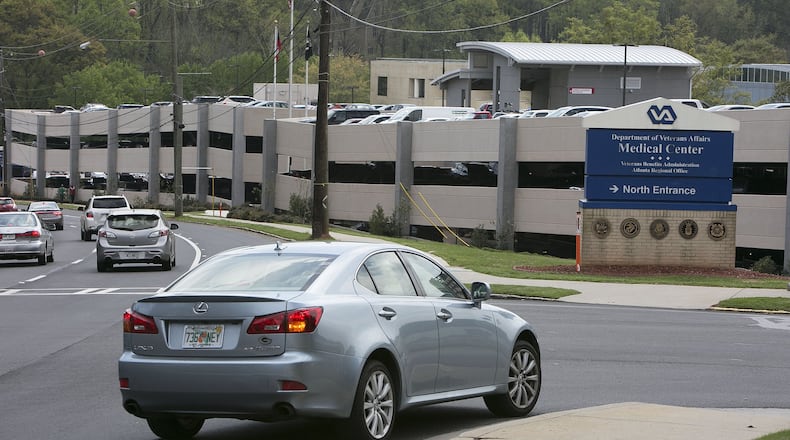The Atlanta VA Medical Center suffered another setback after inspectors discovered more than one ton of hazardous waste packed floor to ceiling in unsafe conditions, recently-released records show.
A portable building was stuffed so full of the hazardous waste that there was no room for inspectors to enter, much less firefighters or emergency equipment, an inspection report said. Some of it was later classified it as “ignitable waste” a state Environmental Protection Division spokesman said — a designation that includes liquids that can catch fire at 140 degrees.
The violations are the latest in a series of troubles at the hospital, which serves 145,000 of the region’s veterans annually and is one of the fastest-growing in the country. Through a spokesman, Atlanta VA director Annette P. Walker said the hospital has proper procedures in place and is hiring a long-term contractor “to assure environmental wastes are properly disposed of timely.”
To experts, it’s troubling that hazardous waste disposal, a basic hospital function, has gone awry. The culture of the entire hospital may need to be reset, said William Custer, director for Georgia State University’s Center for Health Services Research.
“If you don’t have a good system for that, you’re probably not providing good quality care,” said Custer.
Veteran advocates said they’ve seen improvements in certain areas, but this and other recent problems show that the hospital has a long way to go.
“This is the kind of attention to detail and safety issue we’re always concerned about,” Amy Stevens, a former U.S. Navy officer and founder of veterans advocacy group Georgia Military Women, said of the waste violations. “They’ve got plenty of staff, they should be on top of it,” Stevens said.
The Atlanta VA dropped in a Veterans Affairs quality rating from three stars to one, the lowest out of five stars, The Atlanta Journal-Constitution reported last week. This means it ranks among the worst 10 percent VA hospital in the nation.
A Sept. 13 report by the VA's Office of Inspector General found that the Women Veterans Health Program failed to complete mammograms for 42 patients over nearly three years. Another found it had the worst staffing shortages in the country.
A 2017 report found basic cleanliness and safety issues, including damaged furniture and dirty floors, ventilation grills, and kitchen ice machines.
“A given patient, no matter how simple their care, is touched by many parts of any health care organization,” Custer warned. “And if those parts aren’t working smoothly and together, you’re going to have errors and reduced quality of care.”
In the latest case, inspectors found a half-dozen violations during its unannounced inspection on May 30 and 31, which was prompted by a complaint. The VA stored the hazardous waste inside of a 1,050-cubic foot storage building installed on the ground floor of a parking deck. It had been moved from its former site to make room for construction of a new gas turbine power plant.
When inspectors peered inside, they could see no required labels on the containers warning that they held hazardous waste or describing the materials.
Only one of an estimated 600 containers had a label showing the date it entered storage, as required. The box, labeled “investigational chemo waste,” had been there since August 2016.
Other containers held lead, solvents and other hazardous materials. The waste was shipped off site in June, according to the settlement agreement.
The six environmental violations over more than a year cost the VA $13,600 in fines. They could have been punishable by up to $25,000 in fines per day.
Investigators found no other violations at the hospital.
In addition to the fine, the Atlanta VA must submit a written plan for managing it and document proper disposal in 90 days.
A string of bad reports
The veterans administration has repeatedly noted problems at Atlanta’s VA Medical Center in recent months.
June 14: The VA's inspector general found that the medical center has the highest number of staffing shortages of any VA hospital in the country.
Sept. 13: The inspector general found that the Women Veterans Health Program failed to complete mammograms for more than three dozen patients.
Sept. 28: The medical center's quality rating dropped to one star, the lowest out of five, the AJC reported.
About the Author
Keep Reading
The Latest
Featured


